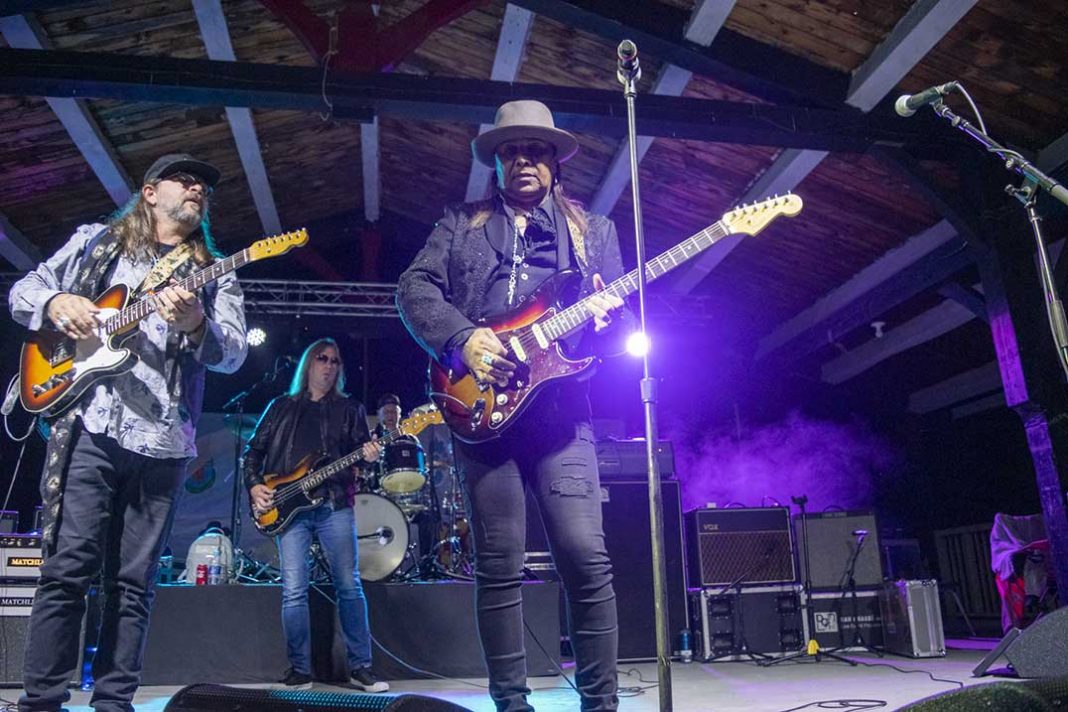WIIKWEMKOONG – The Robinson-Huron Treaty Gathering (RHTG) and Wiikwemkoong Arts and Music Festival (WAMF) proved to be a popular pairing of events judging by the healthy turnout to the joint celebrations held this past weekend at Thunderbird Park and the Thunderdome Arena in Wiikwemkoong.
Thursday evening marked the beginning of the RHTG schedule with a comedy show at the Thunderdome Arena that included hometown talents Lena Recollet and Stephanie Pangowish. Ms. Pangowish also emceed the music festival and interspersed a number of jokes between acts for the benefit of her fans and those who couldn’t attend the Thursday show.
Each morning of the RHTG began with a sunrise ceremony and prayer followed by breakfast. Friday also featured opening ceremonies, including the lighting of the sacred fire, a welcoming song and introductions of the key players of the gathering.
The Robinson-Huron Treaty of 1850 includes individuals now residing in 21 First Nations in Ontario including the seven in the District of Manitoulin. It set up reserves, entrenched hunting and fishing rights and established treaty annuity payments.
In September 2014, the 21 First Nations began legal action against Canada and Ontario for long-standing treaty violations. The treaty annuity had been frozen at $4 since 1874 and the First Nations won the case last December where a judge ruled that the amounts should have risen over time.
Ontario has appealed that ruling and, for the time being, not much has changed. The Robinson-Huron Treaty legal team offered an update to beneficiaries Saturday afternoon as to what the next steps would be. Most of the discussions were protected under solicitor-client privilege but the team did announce the next stage of trial will be starting soon.
Stage two of the three phases in the trial involves setting the liability of the province and country. This will take place from October 15 to 25 in Sudbury and it will be open to the public.
The third and final stage will deal with the final compensation that will be owed to First Nations. These dates are set for April 5 to June 30, 2021.
A highlight of the meeting for many gathered was a keynote by University of Toronto professor Heidi Bohaker, delivered on Saturday morning.
Ms. Bohaker has done considerable research and teaching in the field of Anishinaabe political history near the Great Lakes. She has also focused on Native American writing, communication systems and material culture as sources for history, treaty relationships, federal government policies toward Indigenous peoples in Canada and digital history.
She also has knowledge in digital humanities which highlights best practices for using new technologies alongside Great Lakes First Nations in order to reconnect Indigenous people to their cultural heritage when artifacts are stored in museums and archives worldwide.
Ms. Bohaker is currently studying pre-confederation treaties from 1763 to 1815 and the importance of wampum during treaty negotiations in this region.
Her talk was called Rebuilding the Nation: Histories of Anishinaabe Governance through Alliance. It explored evidence that Anishinaabe law and governance has remained effective and adapted to change as needed over time. This, until the Indian Act mandated band council governance in 1876.
The discussion also explored how Anishinaabe leaders used doodems (clans) to form alliances when making councils. A series of marriages and alliances between council fires had interacted to create a linked system of interdependency between doodems which shared governance roles, leading to a stable, flexible and effective system.
There was a portion on the importance of the gift economy, the role of women in historic governance structures and how new models changed the role of those women under the umbrella of the Indian Act.
After her talk, she fielded a question-and-answers session where attendees asked questions ranging from the repatriation of Indigenous artifacts to the Anishinaabe understanding of the worth of money in the time when these treaties were signed.
Throughout the weekend were breakout sessions including cooking demonstrations, tea-making and an interactive station where attendees were invited to try their hand at skinning a beaver (known in Anishinaabemowin as amik) to prepare its pelt. On Saturday there was also an opportunity to try eating amik.
The musical offerings of the WAMF in the evening were tough to beat. Friday evening saw acoustic musician Leslie Neshkiwe open the list of performers, a list that included Wiikwemkoong favourites Elijah and the Back Burners, the Wiky Three and Pat Peltier.
On Saturday, Leland Bell and Dave Miner began with some Anishinaabe-themed music, followed by Keegan Jacko who played some originals and covers such as a mashup of contemporary songs that began with the year’s hottest country rap crossover, ‘Old Town Road.’
Guelph-based “forward-looking folk” duo Tragedy Ann went up next and deftly switched back and forth between instruments including guitar, accordion and ukulele.
Brothers Wilde took over the stage next, bringing their high-energy act that netted them the 2019 International New Country Duo of the Year award from the North American Country Music Association. By now, the attendance numbers were growing as the headlining acts drew ever closer.
An extra addition to the lineup came after the brothers when MC Sage had a brief feature. He performed a slam poetry ode in tribute to Manitoulin Island and Rainbow Lodge, of which he is currently a resident undergoing treatment.
When Crystal Shawanda began singing after MC Sage, all eyes were fixed on the impassioned notes ringing from her vocal chords above the masterful jams being laid down by the other musicians on stage.
At the end of her set, the grounds lighting shut off and a group of four performers from Debajehmujig Storytellers walked in front of the stage and breathed life into the evening. They came armed with torches and propellants to breathe massive fireballs from their mouths to the delight of spectators of all ages.
The fire-breathers invited the masses to follow them to the baseball field, where a massive wooden guitar stood that had been constructed by Debaj crews earlier. They slowly approached alongside a legion of kids with glowstick-adorned bicycles and then the fire-breathers entered the fence and circled the guitar.
They moved ever closer and directed their flames at the effigy until it caught flame and soon erupted into an inferno while the scores of people gathered around the fence let out a cheer.
As this was all taking place, blues guitar legend Micki Free went up to the stage and began rocking with Crystal Shawanda’s band. The fire-watchers slowly rejoined the music fans who had turned their attention to the stage for the final act of the night.
The RHTG then wrapped up the next day after a few presentations and a closing ceremony. At the end of the RHTG programming on Saturday, Wiikwemkoong Ogimaa Duke Peltier thanked all for attending and attentively listening to the presentations.
“It’s important to get an understanding of what our rights are and what our responsibilities are,” he said.
Ogimaa Peltier also noted that in discussions with the other ogimaak who had come to represent their communities, that they had expressed interest in meeting more regularly to discuss commonalities between their peoples and ways they could work together more closely.
“We do have a ways to go yet, there’s a lot of discussion that needs to happen,” he said.





